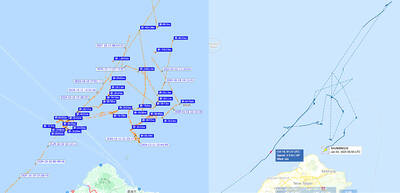Taiwan ranked second in the latest survey by Brown University on online governments, moving one notch higher in the rankings from last year, a statement released by the Cabinet’s Research, Development and Evaluation Commission said yesterday.
Taiwan trailed South Korea, but led the other 96 countries in the study, which was conducted by the university during June and last month.
A total of 1,667 government Web sites were analyzed according to several criteria, including the content of central government Web sites, disability access, the presence of privacy policies and security measures, contact information, foreign-language options, advertisements and user fees, as well as the number of online services.
On a scale of 0 to 100 points, Taiwan’s government Web sites received the highest score in the rating for the offering of online publications, announcements of privacy and security-related policies, and foreign-language options.
Taiwan was given a score of 58.7 in the general e-government rating, lagging behind South Korea’s 64.7 points but beating the US score of 53.7 points — the top three in the annual Brown University survey.
The government statement credited the achievement to efficiency in promoting data transparency.
A study by the commission shows that more than 13 million people above the age of 12 use the Internet nationwide, and the time they spend surfing the net was found to surpass 2.4 hours a day on average.
The Internet has become one of the main channels for communications between the public and the central and local governments, the statement said, adding that the public’s satisfaction with e-government services had reached 62 percent.
To further upgrade online government services, the commission said that the Executive Yuan had prepared a four-year program (starting this year) with three major goals: actively serving public needs, reinforcing social care and boosting network interactions.

A strong continental cold air mass and abundant moisture bringing snow to mountains 3,000m and higher over the past few days are a reminder that more than 60 years ago Taiwan had an outdoor ski resort that gradually disappeared in part due to climate change. On Oct. 24, 2021, the National Development Council posted a series of photographs on Facebook recounting the days when Taiwan had a ski resort on Hehuanshan (合歡山) in Nantou County. More than 60 years ago, when developing a branch of the Central Cross-Island Highway, the government discovered that Hehuanshan, with an elevation of more than 3,100m,

SECURITY: To protect the nation’s Internet cables, the navy should use buoys marking waters within 50m of them as a restricted zone, a former navy squadron commander said A Chinese cargo ship repeatedly intruded into Taiwan’s contiguous and sovereign waters for three months before allegedly damaging an undersea Internet cable off Kaohsiung, a Liberty Times (sister paper of the Taipei Times) investigation revealed. Using publicly available information, the Liberty Times was able to reconstruct the Shunxing-39’s movements near Taiwan since Double Ten National Day last year. Taiwanese officials did not respond to the freighter’s intrusions until Friday last week, when the ship, registered in Cameroon and Tanzania, turned off its automatic identification system shortly before damage was inflicted to a key cable linking Taiwan to the rest of

TRANSPORT CONVENIENCE: The new ticket gates would accept a variety of mobile payment methods, and buses would be installed with QR code readers for ease of use New ticketing gates for the Taipei metro system are expected to begin service in October, allowing users to swipe with cellphones and select credit cards partnered with Taipei Rapid Transit Corp (TRTC), the company said on Tuesday. TRTC said its gates in use are experiencing difficulty due to their age, as they were first installed in 2007. Maintenance is increasingly expensive and challenging as the manufacturing of components is halted or becoming harder to find, the company said. Currently, the gates only accept EasyCard, iPass and electronic icash tickets, or one-time-use tickets purchased at kiosks, the company said. Since 2023, the company said it

China’s newest Type-076 amphibious assault ship has two strengths and weaknesses, wrote a Taiwanese defense expert, adding that further observations of its capabilities are warranted. Jiang Hsin-biao (江炘杓), an assistant researcher at the National Defense and Security Research, made the comments in a report recently published by the institute about the Chinese Communist Party’s (CCP) military and political development. China christened its new assault ship Sichuan in a ceremony on Dec. 27 last year at Shanghai’s Hudong Shipyard, China’s Xinhua news agency reported. “The vessel, described as the world’s largest amphibious assault ship by the [US think tank] Center for Strategic and International